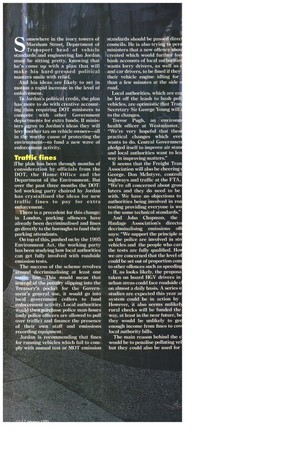Hauliers could find their lorries being stopped more frequently if
Page 48

Page 49

If you've noticed an error in this article please click here to report it so we can fix it.
local authorities win the power to take over revenueraising roadside checks... S th oinewhere in e ivory towers of Nlarsham Street, Department of Transport head of vehicle standards and engineering Ian Jordan must be sitting pretty, knowing that he's come up with a plan that will make his hard-pressed political masters smile with relief.
And his ideas are likely to set in motkon a rapid increase in the level of enfoicement.
To Jordan's political credit, the plan has more to do with creative accounting ,than requiring DOT ministers to compete with other Government departments for extra funds. If ministersf gree to Jordan's ideas they will i levy nother tax on vehicle owners—all in it worthy cause of protecting the environment—to fund a new wave of enforcrn ' ent activity. Tra fI "c fines (The plan has been through months of consideration by officials from the DOT, the Home Office and the Department of the Environment. But over the past three months the DOTled working party chaired by Jordan has crystallised the ideas for new traffic fines to pay for extra enforcement.
There is a precedent for this change: in London, parking offences have already been decriminalised and fines go directly to the boroughs to fund their parking attendants.
On top of this, pushed on by the 1995 Environment Act, the working party has been studying how local authorities can get fully involved with roadside emission tests.
, The success of the scheme revolves ' around decriminalising at least one , toil*: fine., This would mean that instead of the penalty slipping into the TreasurY's. -pocket for the Government's general use, it would go into local government coffers to fund enforcement activity. Local authorities would then purchase police man-hours (only police officers are allowed to pull over traffic) and finance the presence of their own staff and emissions recording equipment.
Jordan is recommending that fines for running vehicles which fail to comply with annual test .or MOT emission standards should be passed direc councils. He is also trying to per ministers that a new offence sho created which would further fee bank accounts of local authoritiewants lorry drivers, as well as and car drivers, to be fined if they their vehicle engine idling for than a few minutes at the side •_ road.
Local authorities, which are ea be let off the leash to bash pa vehicles, are optimistic that Tra Secretary Sir George Young will!: to the changes.
Trevor Pugh, an enviro health officer at Westminster, !. "We're very hopeful that the:: practical changes which eve , wants to do. Central Govermue pledged itself to improve air stan. and local authorities want to lea way in improving matters."
It seems that the Freight Tran Association will also be cheering George. Don McIntyre, control' highways and traffic at the FTA, "We're all concerned about gros haters and they do need to be with. We have no objections to authorities being involved in roa testing providing everyone is wo to the same technical standards."
And John Chapman, the Haulage Association's direct() decriminalising emissions off says: "We support the principle a as the police are involved in sto vehicles and the people who car' the tests are fully qualified. Hon we are concerned that the level o i could be set out of proportion coin to other offences such as speedint-; If, as looks likely, the prowsa taken on board HGV drivers in urban areas could face roadside c on almost a daily basis. A series el studies are expected this year a system could be in action by However, it also seems unlike!. rural checks will be funded the way, at least in the near future, they would be unlikely to ge enough income from fines to coy local authority bills.
The main reason behind the c would be to penalise polluting vel but they could also be used for












































































































